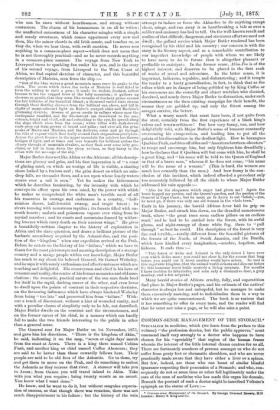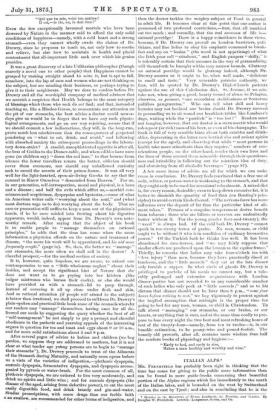COMMON-SENSE MANAGEMENT OF TILE STOMACH.* SPECIALISM in medicine, which (we
learn from the preface to this volume) "the profession decries, but the public approves," must commend itself very strongly to a doctor who happens to have chosen for his "speciality" that region of the human frame wherein the interest of the little internal drama centres for us all. There are fortunately numbers of persons amongst us who do not suffer from gouty feet or rheumatic shoulders, and who are never practically made aware that they have either a liver or a spleen. But few, indeed, are those who can boast of similar blissful ignorance respecting their possession of a Stomach; and who, con- sequently do not at some time or other fall legitimately under the care of the man of medicine who has made this organ his domain. Beneath the portrait of such a. doctor might be inscribed Voltaire's epigraph on the statue of Love :—
* Common-sense Management of the Stomach. By George Overend Drewry, IILD London : Henry S. King and Co.
"Qui quo to so* voiei ton maitre ! Ii est,—le fat, ou, le dolt acre !"
Even the few exceptionally favoured mortals who have been dowered by Nature in the manner said to afford the only solid conditions of happiness—namely, with a cold heart and a strong stomach—even they cannot wholly evade the claims of Dr. Drewry-, since he proposes to teach us, not only how to soothe and relieve, but also how to maintain in health and placid contentment that all-important little sack over which his genius presides.
It was a great discovery of a late Utilitarian philosopher (though scarcely a novel one to other people) that Happiness cannot be grasped by rushing straight ahead to seize it, but is apt to fall, somehow, into the lap of men and women who are not thinking on the subject, but are minding their business, or perhaps trying to give it to their neighbours. May we dare to confess before Dr. Drewry and all the worshipful company of medical advisers that we nourish a suspicion that Health belongs to the same category of blessings which those who seek do not find; and that, instead of teaching us, like a Hindoo Guroo, to concentrate our attention on the pit of our stomachs, the best advice a doctor could now-a- days give us would be to forget that we have any such physio- logical arrangements, and go on our way rejoicing, secure that if we should commit a few indiscretions, they will, in the long-run, prove much less mischievous than the consequences of perpetual pondering on "what to eat, drink, and avoid," and following with absorbed anxiety the subsequent proceedings in the labora- tory down-stairs? A candid, unsophisticated appetite is after all, the best of Guides to the Dinner-table, and when edibles have once gone (as children say) " down the red lane," to that bourne from whence the fewer travellers return the better, oblivion should cover them evermore, nor should any unhallowed curiosity seek to unveil the secrets of their prison-house. It was all very well for the light-hearted, open-air-living Greeks to say that the counsel to Know Ourselves " descended from Heaven." For us, in our generation, self-introspection, moral and physical, is a bane and a disease ; and half the evils which afflict us,—morbid con- sciences and scepticisms, dyspepsias and hysterias,—come of what an American writer calls "worrying about the soul," and (what most doctors urge us to do) worrying about the body. That no care or precaution will suffice to keep a man out of the physician's hands, if he be once misled into fretting about his digestive apparatus, would, indeed, appear from Dr. Drewry's own note- worthy remark. After saying that the object of his book is to enable people to " manage themselves on rational principles," he adds that- the time has come when the more information a physician affords on the nature and treatment of disease, "the more his work will be appreciated, and his aid more frequently sought." (page ix). So, then, the better we " manage " our stomachs, the more often we shall call in the doctor ! A cheerful prospect,—for the medical section of society.
It is, however, quite hopeless, we are aware, to exhort our contemporaries to use a "little wholesome neglect" about their insides, and accept the significant hint of Nature that she does not want us to go prying into her kitchen (like vulgar mistresses who harass their cooks), or else she would have provided us with a stomach -lid to peep through, instead of covering it all up close under flesh and skin. And as rational attention (if people will attend to the subject) is better than irrational, we shall proceed to cull from Dr. Drewry's plain-spoken and practical little book some of the counsels whereby our readers may "manage" themselves, having once for all de- livered our souls by suggesting the query whether the best of all "self-management" be not simply to pay a prompt and cheerful obedience to the pathetic and yearning appeals of the interesting organs in question for tea and toast and eggs about 9 or 10 a.m., and for more solid satisfactions about 2 and 8 p.m. After several pages of advice to babies and children (we beg pardon, we suppose they are addressed to mothers, but it is not clear at what tender age yoling persons are to begin to "manage their stomachs"), Dr. Drewry proceeds to treat of the Ailments of the Stomach during Maturity, and naturally soon opens before us a vista of the varieties of indigestion,—plethoric dyspepsia, anaemic dyspepsia, fermentative dyspepsia, and dyspepsia accom- panied by pyTosis or water-brash. For the most common of all, plethoric dyspepsia, we are ordered to live very moderately, and drink no spirits and little wine;- and for anaemic dyspepsia (the disease of the aged, arising from defective power), to eat the most easily digestible food, and drink brandy and gin-and-water. Similar prescriptions, with more drugs than our feeble faith c an swallow, are recommended for other forms of indigestion, and
then the doctor tackles the weighty subject of Food in general in adult life. It becomes clear at this point that our author is possessed of two profound convictions,--fm3t, that all mankind eat too much ; and secondly, that the real areanum of life is— oatmeal porridge ! There is a happy coincidence in those views, because, if Dr. Drewry can prevail on London barristers, poli- ticians, and fine ladies to obey his emphatic command to break- fast and sup on " basins " (the word is not appetising) of what the Irish poor call " stirabout," and English paupers " skilly," it is tolerably certain that their excesses in the way of gormandising will thenceforth be brought within very narrow bounds, Gluttony on oatmeal porridge would be gluttony indeed, although Dr. Drewry assures us it ought to be, when well made, "delicious in smell and taste." Very venerable patristic authority, we fear, will .be quoted by Dr. Drewry's High-Church patients against the use of this Caledonian diet. St. Jerome, if we mis- take not, when giving a good, hearty round of abuse to Pelagius, observes, en passant, "nee recordatur stolidissimus et Scotorum pultibus prmgravatus." Who can tell what dull and heavy heresies may not becloud our brains should Dr. Drewry succeed in persuading us to sit round our breakfast-tables like Landseer's dogs, waiting while the " parritch" is "too hot?" Readers must not imagine, however, that our doctor is a stern ascetic who would rob a poor (or rich) man of his beer, or even of his champagne. The book is full of very sensible hints about both eatables and drink- ables, deprecating in the latter case bottled ales and ardent spirits (except for the aged), and observing that while " most persons in health take more stimulants than they require," numbers of con- scientious people, on the other hand, render their own lives and the lives of those around them miserable through their querulous- ness and irritability in following out the mistaken idea of duty, and abstaining from all alcoholic beverages " (page 87).
A few more items of advice are all for which we can make room in conclusion. Dr. Drewry feels convinced that a free use of soda, seltzer, or potass-water is weakening to the stomach, and that they ought only to be used for occasional refreshment. A mixed diet is, for every reason, desirable ; even to keep down excessive fat, it is better to diminish the quantity of food than (on Banting's prin- ciples) to avoid certain kinds thereof. "The nervous force has more influence over the deposit of fat than the particular kind of ali- ment taken." Persons of a sanguine temperament derive benefit from tobacco ; those who are bilious or nervous are undoubtedly better without it. For the young (under four-and-twenty), the " weed " is always bad. Of the cold bath Dr. Drewry " cannot speak in too strong terms of praise. No man, woman, or child ought to be without it who is in condition of ordinary locomotive power." Of the Turkish bath he thinks less well. It has been abandoned for race-horses, and " we may fairly suppose that similar effects are produced upon the human as the equine frame." Thirdly, he remarks that ladies may take four-o'clock tea with "less injury" than men, because they have practically dined at luncheon, and the " little morsels " they eat at the late dinner only furnish a supper. In what circle of ghouls Dr. Drewry is privileged to partake of his meals we cannot say, but a tole- rably prolonged and extensive acquaintance with London dinner-parties has not revealed to us any considerable number of such ladies who only peck at " little morsels ;" and as to his dictum that dinner should not be later than 8 p.m., "some four hours before retiring to rest," we beg vigorously to protest against the implied assumption that midnight is the proper time for going to bed for any man, woman, or child in Christendom. To talk about " managing " our stomachs, or our brains, or our hearts, or anything that is ours, and at the same time coolly to pro- pose to lose every night the two best and most refreshing hours of rest of the twenty-four—namely, from ten to twelve—is, in our humble estimation, to be penny-wise and pound-foolish. The homely old proverb, after all, contains more wisdom than half the modern books of physiology and hygiene :—
" Early to bed, and early to rise,
Makes a man healthy and wealthy and wise."































 Previous page
Previous page